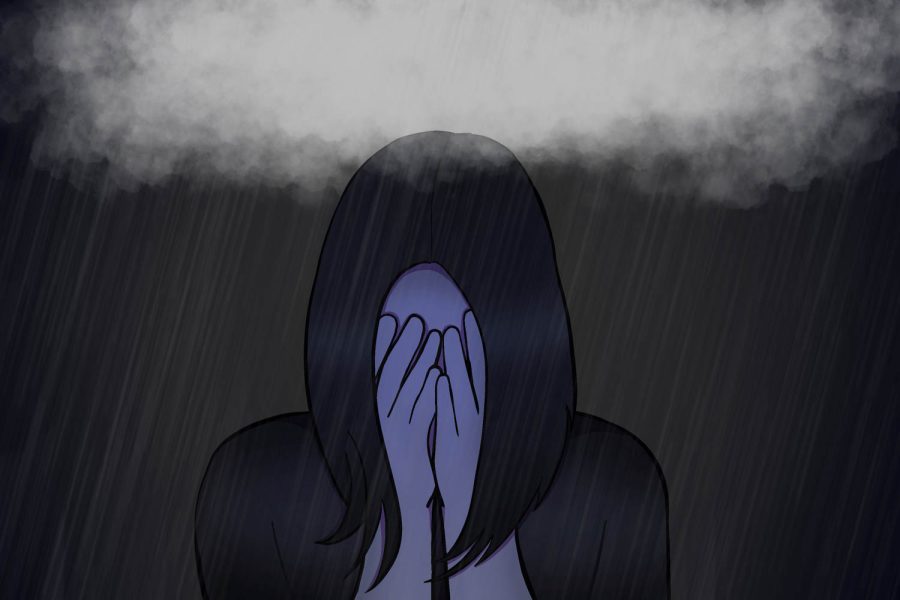College students increasingly face mental health concerns, report states
More than half of all college students concerned about their mental health, WSU provides services to help
Some of the biggest concerns students are dealing with when they come to CAPS are usually anxiety and depression.
April 18, 2023
In the past three years, student mental health has been taking a hit. More than 60% of college students met the criteria for at least one mental health problem during the 2020–21 school year, according to the American Psychological Association.
Eric Wright, Counseling and Psychological Services senior clinical staff and interim outreach director, has been at WSU for six months and a licensed therapist for three years. He said he has seen students seek help for mental health concerns for many different reasons.
“Some have anxiety connected to schoolwork, tests, finals, others are dealing with anxiety from friends, living in the dorms,” Wright said. “Something many students are still dealing with is the effects of COVID. That’s been one still many students are dealing with. Also, the recent events, not a lot, but the murders at University of Idaho, have caused some people to seek help here.”
Wright said CAPS is the main service offered to students who are dealing with mental health concerns, although another option that WSU offers is the Resident Hall Association, so students are able to talk to an RA if needed.
“There are multiple CAPS services that are offered,” he said. “Individual counseling, groups and workshops. Everyone is really trained to guide them to CAPS.”
Some of the biggest concerns students are dealing with when they come to CAPS are usually anxiety and depression, Wright said. He has met many people who are referred to CAPS by a friend or RA.
Wright said he has not noticed a trend of more students seeking help from CAPS, but an overall trend he has noticed in mental healthcare is that more people are open about the struggles they are dealing with and more willing to talk to someone about them.
“I think throughout our lives, especially with adolescents and young adults, we all need to talk to someone at one point or another,” he said. “I think it’s good that students are seeking mental help. I think there’s becoming less of a stigma. I know, at least in my generation, you just figured it out, you didn’t get help.”
Wright said in the past three years or so, the pandemic has had a big impact on student mental health, especially among those who were preparing to graduate high school around that time. This is in part due to many students missing “transitional moments,” such as graduation or prom.
In addition to these causes, according to Frontiers.org, lacking interest in fieldwork and various social challenges such as poverty can contribute to “mental distress and discomfort associated with undergraduates.”
Senior English major Levenson Policarpio has utilized CAPS’s services twice, during the 2019–20 school year and again during the 2021–22 school year.
“This is when they usually have people on a waitlist and if you’re more so in distress then you’re put higher on the list and they immediately try to set up sessions on a weekly or biweekly basis,” Policarpio said.
Policarpio said he first heard about CAPS during his freshman year. He felt compelled to reach out and use CAPS’s services because he found it difficult to adjust to college life before the pandemic.
“I was told about how you have 12 free sessions per semester,” Policarpio said. “I was someone who went to Washington state literally from another country and I was shocked to see how different it was from my regular life.”
From his two experiences with CAPS, Policarpio said he opened up to and grew attached to the counselors who he spoke with, although the biggest problem with the service currently is the 12-session per semester limit.
Policarpio said this can be a source of frustration because after his sessions with the counselors each semester he had become used to speaking to them about what he was dealing with and did not want to start the process over with another person. Additionally, it can be financially challenging for students to get help from a service off-campus.
“Being a college student, it can be difficult, especially if you’re lacking funds, to pay for sessions outside the university,” he said.
Outside of CAPS, Policarpio said a few other good resources out there for students seeking mental health resources would be Cougs for Recovery and the Women*s Center, which has some things in the way of mental health resources such as destress workshops.
Policarpio said there could be more done at the university level to help students out there who are struggling and don’t know how to go about it, but acknowledged that they are taking more of an interest in helping students struggling with their mental health.
“WSU is not perfect when it comes to mental health awareness, but I know that they are trying their best to make sure they are accessible to everyone,” he said. “It’s just that it’s difficult to feel safe during those times when people don’t even want to come out of their houses, but I know there’s a good lot of people who want to do that regardless.”
As mentioned, another resource for students is Cougs for Recovery. Patricia Maarhuis, principal investigator for Washington Collegiate Recovery Initiative and health promotion specialist, said it is a community of students fostering connections through similar experiences which exists primarily on the Pullman and Global campuses.
“It’s about harm reduction. We’re really about providing services and resources for living well. We do that through scholarships, peer-to-peer mentoring, really fun events,” Maarhuis said. “Some people, when they hear the word ‘recovery,’ may think ‘oh, it’s an intervention,’ when it’s really not.”
Maarhuis said students come to Cougs for Recovery for a variety of different reasons, ranging from students suffering from occasional substance abuse to students wanting to have an experience with others not related to drugs or alcohol.
“The other aspect is someone might have a substance abuse disorder and are looking for a welcoming environment where they can just be around others,” Maarhuis said. “It’s never mandated, it’s open and voluntary.”
The primary contact students will have in Cougs for Recovery is with other students, or recovery coaches, who are trained WSU students from a variety of different areas of study and backgrounds, Maarhuis said.
Nicole Williams, junior social sciences major, is one of the recovery coaches at Cougs for Recovery. She said she has been involved with the program for the past two semesters.
Williams said Cougs for Recovery is helpful to students because it provides a welcoming space to students who may be struggling privately.
“My youth was very bad, I had to drop out of school,” Williams said. “I don’t think everyone’s experience should have to be like that.”
In addition to welcoming students who may have mental health concerns, Williams said Cougs for Recovery is welcoming to those who might be interested in looking into being an ally to others who are struggling.
Cougs for Recovery has been an available resource for students since around 2017-18, Maarhuis said. She has been involved with the program since its inception.
“In about 2019 I submitted for a contract, a grant with the state of Washington health care authorities and that really solidified funding for us,” she said. “In about 2020 we became a part of the dean of students office instead of an RSO and hired in the students to be official recovery coaches. Then we really started going from there.”
Maarhuis said she is always amazed with how open students can be when talking about their mental health. She said she has observed the trend of students taking greater interest in mental healthcare and the creation of groups such as Cougs for Recovery focused on mental health.
“It’s a very strong trend for peer recovery coaches and staff to work with students in recovery,” she said. “I think we’re in a beginning stage and we’re really starting to expand. If you look at our social media pages, we’re really gaining more and more followers and students tell me that’s where they often first hear about us.”
Maarhuis said she has noticed there is often a lot of judgment and stigma around mental health, but that over time with any new way of thinking, she believes those stigmas are fading.
“Everyone is welcome,” she said. “We really hope people will take a look at our social media and we have a lot of students just because it’s fun to hang out and do art or do yoga and we have a lot of other partnerships with other student groups.”
Williams said students can reach Cougs for Recovery via their email, [email protected] or their Facebook or Instagram pages.
As interim outreach coordinator, Wright said that CAPS has been trying to work with many different areas on campus, including Greek Life and resident halls to reach out to students and make it clear they are an available service.
“We regularly do workshops and seminars. About a month ago we did an outreach with all the RA’s,” Wright said. “We have a pretty intense program to connect. That’s one of those things that as a student, you hear a lot of things but we don’t retain it all.”
Wright said CAPS is still trying to consider new ways to promote it to students. He said he encourages students who are dealing with mental health concerns to go to their website.
Wright said students who have serious concerns can also give them a call. CAPS crisis support line is available for students facing crisis situations such as thoughts of suicide and not being able to function due to extreme psychological distress, according to their website.











